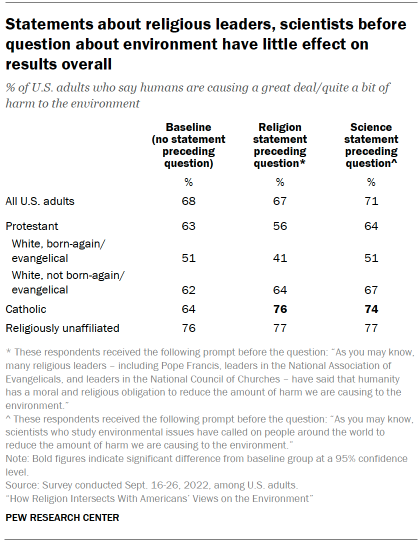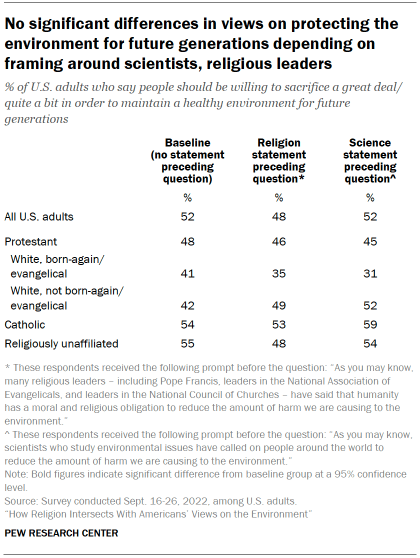Pew Research Center conducted an experiment to better understand how religious leaders’ messages might influence their followers’ views on the environment. Using a sample of more than 3,000 U.S. adults that was separate from the main survey, the experiment posed two questions.
A third of the respondents were shown the following:
As you may know, many religious leaders – including Pope Francis, leaders in the National Association of Evangelicals, and leaders in the National Council of Churches – have said that humanity has a moral and religious obligation to reduce the amount of harm we are causing to the environment.
How much harm do you think humans are causing to the environment?
1 A great deal of harm
2 Quite a bit of harm
3 Some harm
4 A little harm
5 No harm at all
(Shown on next page):
How much should people be willing to sacrifice today in order to maintain a healthy environment for future generations?
1 A great deal
2 Quite a bit
3 Some
4 A little
5 Nothing at all
Another third of respondents were shown the same two questions, but with the following prompt at the beginning:
As you may know, scientists who study environmental issues have called on people around the world to reduce the amount of harm we are causing to the environment.

The remaining third of respondents were shown the same two questions, but without any introductory text.
Conducting the experiment in this way allows comparisons of whether each statement has an influence on how respondents answer questions about the environment. The results indicate that reading either statement immediately before these questions does not have much impact on the answers.
For example, people who received the statement about religious leaders were 1 percentage point less likely than people who did not get a preface to the question to say humans are causing a great deal or quite a bit of harm to the environment, a difference that is not statistically significant. Likewise, those who got the statement about scientists were 3 points more likely than those who did not receive a preface to say humans are causing at least “quite a bit” of harm to the environment – again, not a statistically significant difference.
These statements do seem to move the needle for members of some religious groups. Catholics who received either the prompt about religious leaders or the one about scientists were more likely than those who did not receive any prompt to say humans are causing harm to the environment.

The prompt appears to have had the opposite impact on White evangelical Protestants.14 Evangelicals who received the prompt about religious leaders were 10 percentage points less likely than those who did not receive a prompt to say humans are causing harm to the environment. Given the limited sample size, this 10-point difference is not significantly different at the 95% confidence level (Pew Research Center’s typical threshold for determining statistical significance). It is, however, significant at the 85% confidence level.
Across the board, neither of the prompts significantly affected responses to the second question, about the extent to which people should be willing to sacrifice to maintain a healthy environment for future generations. And overall, the experiment suggests that these statements have minimal, if any, effect on how respondents answered these questions.


